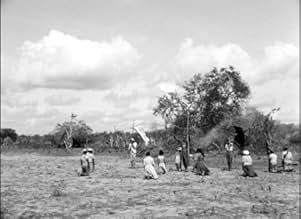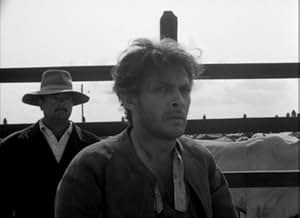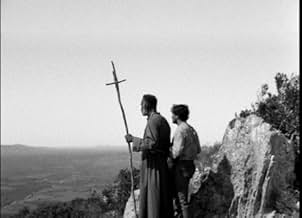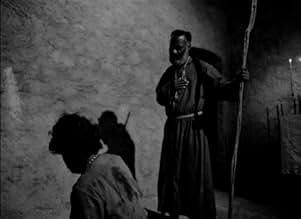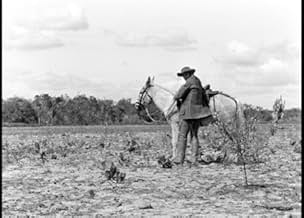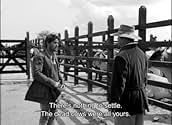AVALIAÇÃO DA IMDb
7,1/10
6 mil
SUA AVALIAÇÃO
Manuel se revolta contra a exploração imposta pelo coronel Moraes e acaba matando-o numa briga. Ele passa a ser perseguido o que faz com que fuja com sua esposa, e se junta aos seguidores do... Ler tudoManuel se revolta contra a exploração imposta pelo coronel Moraes e acaba matando-o numa briga. Ele passa a ser perseguido o que faz com que fuja com sua esposa, e se junta aos seguidores do beato Sebastião que promete o fim do sofrimento.Manuel se revolta contra a exploração imposta pelo coronel Moraes e acaba matando-o numa briga. Ele passa a ser perseguido o que faz com que fuja com sua esposa, e se junta aos seguidores do beato Sebastião que promete o fim do sofrimento.
- Direção
- Roteiristas
- Artistas
- Prêmios
- 1 indicação no total
Milton Rosa
- Moraes
- (as Milton Roda)
Marrom
- Cego Júlio
- (não creditado)
- Direção
- Roteiristas
- Elenco e equipe completos
- Produção, bilheteria e muito mais no IMDbPro
Avaliações em destaque
This film begins wonderfully, brilliantly shot and keenly acted- but right as you're sure it's coming to a close, the music suddenly runs uptempo and the narrator says the equivalent of "Wait, there's more!" and the second segment of the film destroys any credibility the first might have established. The director's portrayal of the desert's harshness lends logically to the lunacy of the characters- but Rosa's actions in the second half seem completely unmotivated, as if the actors ran out of script and just start making things up out of boredom in front of the camera. Laudable attempts at Eisenstein-style multiple-repeat editing are a good idea but using them to cover the low-budget nature of the action scenes is not. Overall worth seeing, but I must warn you that I fell asleep towards the end.
Glauber Rocha just 25 when he made this and I was only seven year younger although I had never watched this before but maybe then I might have loved it more but now I find it rather difficult. Clearly I can see that it is an amazing idea but punishing to have done this in Monte Santo, Bahia this drought-ridden hinterland of the North-East of Brazil. Manoel has killed his cheating ranch owner and then his mother dies and he and his wife go off to follow a self proclaimed saint. It is slow, and Christ like but also much violence. Although there is even more to come. It is difficult watching Manoel climb up the mountain on his knees and with a 20 kilo stone on his head and apparently the actor decided he should really do it. I found that during this part I thought of Bunuel with Simon of the Desert (1965) and his man on a column. Towards the end with the last few people moving between each other and I thought of Michelangelo Antonioni. Now and again I wondered about Jodorowsky's El Topo (1970), however this film is on its own and even if it is a bit slow it is surely worth a look.
Like Karl Marx's Communist Manifesto, Deus e O Diabo Na Terra Do Sol, (translated: God and the Devil in Land of Sun) doesn't bother mincing words when addressing what's wrong with the world. As Communism swept through South America and Cuba in the 50's and 60's, Socialist film-making enjoyed its greatest hey dey and, amongst those films, DeODNTDS is remembered as one of the best. Whereas films like Mikhail Kalatozov's I Am Cuba were unabashed agents of propaganda, bashing Capitalism with a hammer-like heavy hand, Glauber Rocha's efforts were hidden behind the symbolism of one man's Chaucer-esque journey into an unknown fate.
The journey is Manuel's, an impoverished farmer who is radicalized after killing his boss who (like evil capitalists do) attempted to cheat Manuel of his wages. Manuel then finds God, in the form of a self-proclaimed Saint named Sebastian. Before long, Sebastian's blood thirsty spell over Manuel is broken by Rosa, Manuel's dutiful (and long-suffering) wife. But soon after they're free from Sebastian's grip, Manuel is seduced by the charms of a charismatic and similarly blood thirsty bandit named Corisco. Such is the way with Manuel, doomed to follow, and it is this theme that strangles the life out of Rocha's film.
DeODNTDS is a scathing indictment of not only capitalism, but also of religion and society as a whole. In this world, man is desperately out of balance with nature (and thus himself), wishing (and prophesying) for the land to turn to sea and the sea to turn to land. These fruitless dreams are a constant reminder that man must look inward, to find strength from his own heart and hands. The message is unmistakable, as stark as the black and white imagery Rocha bombards us with, but the trouble with DeODNTDS is that it makes it's point early on is compelled to repeat it over and over again, not unlike a mantra.The inevitable fate of Manuel is set up mid-way through the first act, when bounty hunter Antonio das Mortes is hired by church and city officials to kill Saint Sebastian and put an end to his proletariat uprising (which threatens the establishment aka the money making machine). But das Mortes' hunt is sidetracked and ultimately stalled to such a degree that by the time he and Manuel come face to face, no real stakes remain. In the process of pitting these two against one another, Rocha's film gets bogged down in dogmatic digressions that drag out for what feels like an eternity. By the time the credits roll, the momentum of the powerful first act is lost, and instead of challenging its audience's socio-political allegiances, Deus eO Diablo Na Terra Do Sol merely challenges you to stay awake.
The journey is Manuel's, an impoverished farmer who is radicalized after killing his boss who (like evil capitalists do) attempted to cheat Manuel of his wages. Manuel then finds God, in the form of a self-proclaimed Saint named Sebastian. Before long, Sebastian's blood thirsty spell over Manuel is broken by Rosa, Manuel's dutiful (and long-suffering) wife. But soon after they're free from Sebastian's grip, Manuel is seduced by the charms of a charismatic and similarly blood thirsty bandit named Corisco. Such is the way with Manuel, doomed to follow, and it is this theme that strangles the life out of Rocha's film.
DeODNTDS is a scathing indictment of not only capitalism, but also of religion and society as a whole. In this world, man is desperately out of balance with nature (and thus himself), wishing (and prophesying) for the land to turn to sea and the sea to turn to land. These fruitless dreams are a constant reminder that man must look inward, to find strength from his own heart and hands. The message is unmistakable, as stark as the black and white imagery Rocha bombards us with, but the trouble with DeODNTDS is that it makes it's point early on is compelled to repeat it over and over again, not unlike a mantra.The inevitable fate of Manuel is set up mid-way through the first act, when bounty hunter Antonio das Mortes is hired by church and city officials to kill Saint Sebastian and put an end to his proletariat uprising (which threatens the establishment aka the money making machine). But das Mortes' hunt is sidetracked and ultimately stalled to such a degree that by the time he and Manuel come face to face, no real stakes remain. In the process of pitting these two against one another, Rocha's film gets bogged down in dogmatic digressions that drag out for what feels like an eternity. By the time the credits roll, the momentum of the powerful first act is lost, and instead of challenging its audience's socio-political allegiances, Deus eO Diablo Na Terra Do Sol merely challenges you to stay awake.
This movie is considered by the critics as the most important Brazilian movie of all times. And they are right in this point. An impressive, outstanding portrait of Brazilian rich culture with a focus on some delicate subjects as religion, faith, violence and economic exploration. Rocha made here a fantastic synthesis of the main problems of Brazil, problems that still remained almost forty years after. Great performances by Del Rey and Mauricio do Valle.
Nothing wrong with a movie that is being a bit slower and different, as long as it fascinates. And this movie does that well.
It's an unusual movie, with an unusual approach and story. This is not a slick Hollywood movie here but an artistic South-American one. It doesn't really follow any familiar movie rules but having said that, this movie at the same time still remains a perfectly accessible one.
Even though there are of course some deeper meanings behind it all, the movie never feels too serious or heavy handed. The movie actually still manages to entertain as well, which is for most part thanks to its very lively characters, who especially come to live in its second half. Most people seem to have most problems with the movie its second half but I actually do think that this was the strongest and most intriguing part of the entire movie, since it seemed to focus more purely on its characters and less on its story, that is a complicated one to follow and completely understand.
What I foremost love about this movie is that it's being shot like a western, while it's actually a totally different genre movie, set in Brazil. The cinematography, directing, characters and such still make this movie really feel and look like a good old spaghetti western.
Due to its directing approach and way of storytelling this is a very visual orientated movie. Even though it can be a slow movie at times, its visuals still manages to fully keep you interested throughout. It's black & white cinematography does ensure this well.
No need and reason to overpraise this movie but it remains simply a good and special one to watch.
7/10
http://bobafett1138.blogspot.com/
It's an unusual movie, with an unusual approach and story. This is not a slick Hollywood movie here but an artistic South-American one. It doesn't really follow any familiar movie rules but having said that, this movie at the same time still remains a perfectly accessible one.
Even though there are of course some deeper meanings behind it all, the movie never feels too serious or heavy handed. The movie actually still manages to entertain as well, which is for most part thanks to its very lively characters, who especially come to live in its second half. Most people seem to have most problems with the movie its second half but I actually do think that this was the strongest and most intriguing part of the entire movie, since it seemed to focus more purely on its characters and less on its story, that is a complicated one to follow and completely understand.
What I foremost love about this movie is that it's being shot like a western, while it's actually a totally different genre movie, set in Brazil. The cinematography, directing, characters and such still make this movie really feel and look like a good old spaghetti western.
Due to its directing approach and way of storytelling this is a very visual orientated movie. Even though it can be a slow movie at times, its visuals still manages to fully keep you interested throughout. It's black & white cinematography does ensure this well.
No need and reason to overpraise this movie but it remains simply a good and special one to watch.
7/10
http://bobafett1138.blogspot.com/
Você sabia?
- CuriosidadesIn the scene where we see Manuel (Geraldo Del Rey) carrying a huge stone over his head while climbing Monte Santo on his knees, Del Rey insisted on carrying a real stone that weighted over 20 kilos - something that really worried director Glauber Rocha. After the shooting, Del Rey had to take 2 days off, as he wasn't in condition to show up.
- ConexõesEdited into A Edição do Nordeste (2023)
- Trilhas sonorasManuel e Rosa
Written by Glauber Rocha & Sérgio Ricardo
Principais escolhas
Faça login para avaliar e ver a lista de recomendações personalizadas
- How long is Black God, White Devil?Fornecido pela Alexa
Detalhes
- Data de lançamento
- País de origem
- Central de atendimento oficial
- Idioma
- Também conhecido como
- Black God, White Devil
- Locações de filme
- Empresas de produção
- Consulte mais créditos da empresa na IMDbPro
Bilheteria
- Faturamento bruto nos EUA e Canadá
- US$ 7.826
- Fim de semana de estreia nos EUA e Canadá
- US$ 3.200
- 19 de nov. de 2023
- Faturamento bruto mundial
- US$ 7.826
- Tempo de duração
- 2 h(120 min)
- Cor
- Mixagem de som
- Proporção
- 1.37 : 1
Contribua para esta página
Sugerir uma alteração ou adicionar conteúdo ausente


